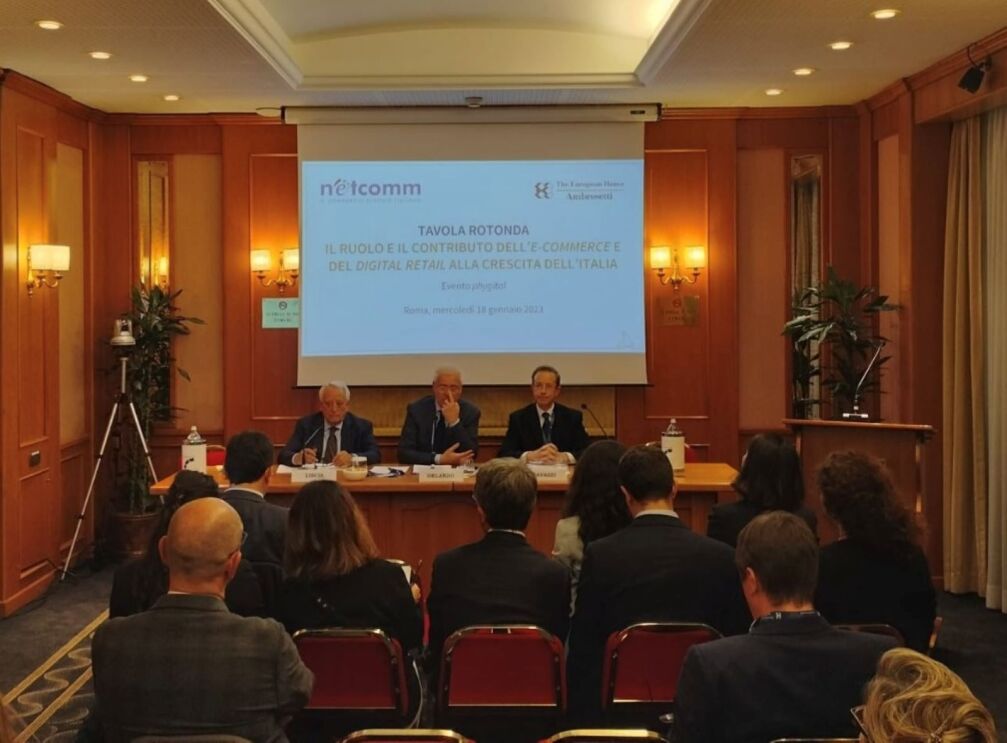E-commerce is an important resource for the growth of Italy’s economy: data revealed from recent research by Netcomm, the Italian Digital Commerce Consortium, in collaboration with The European House - Ambrosetti, prove its role as the main driver.
In fact the research, titled "The Role and Contribution of E-commerce and Digital Retail to the Growth of Italy" reports that, in the five years from 2016 to 2020, the entire e-commerce and digital retail network in Italy accounted for 40.6% of the growth in total revenue of private Italian economic activities, and generated more than €70 billion in revenue.
Moreover, data show that for every €100 invested in the e-commerce and digital retail supply chain in Italy, an additional €148 is generated in the extended supply chain, including indirect and induced impacts. This evidence shows how digital commerce represents the leading growth multiplier for the Italian economy.
These are important numbers for a country like Italy, which still registers very low levels of basic and advanced digital skills compared to the European average - according to the Digital Economy and Society Index (DESI), to date, only 13% of SMEs sell online, compared to a European average of 18%.
The theme of skills and training therefore plays a central role in the growth of Italian companies, and thus the economic and productive network of the country.
We believe it is essential to strengthen public initiatives to support businesses in acquiring digital skills and the awareness that they can reach customers around the world. In this sense, Amazon is steadfastly committed to developing effective synergies between public and private sectors.

In particular, up to now, we have signed seven Memoranda of Understanding (MoUs) with different Italian regions to support the digitization and internationalization of local SMEs. The initiative is developed through Accelera with Amazon, a free training program, now in its third year, created together with public and private partners, which, to date, has supported more than 35,000 SMEs, with more than 65% of participants starting their business online and more than 55% extending their offerings internationally. In addition, we have united training with the possibility of adequate promotion and greater opportunity for visibility, including at the international level with Amazon's Made in Italy showcase, which, since 2015, offers Italian artisans and SMEs the opportunity to introduce themselves to an international audience.
In addition to Italy, the showcase is available on the following Amazon stores: U.S., UK, Germany, France, Spain, Japan, UAE, Netherlands, Poland and Sweden. To date, the total selection of Made in Italy products available in all Amazon stores has reached 1 million items, with more than 4,500 Italian artisans and SMEs using the showcase to export their products beyond national borders. As part of the initiatives to support Made in Italy in the world, we also launched the “Amazon Incubator” pilot project to guide more than 100 Italian businesses in their internationalization process. Finally, in 2021 we launched Made in Italy Days, the first four-day international event to promote Made in Italy products around the world. The event was made possible thanks to collaboration with Farnesina and ICE, and it was a great success, recording more than 50% sales from abroad.
The initiatives we implemented allowed us to achieve significant results: in 2021, the more than 20,000 Italian SMEs selling on Amazon recorded sales abroad of about €800 million; among them, over 200 exceeded €1 million in sales for the first time. Our commitment continues: as announced during the Made in Italy Days initiative, we will help Italian SMEs selling on Amazon to reach €1.2 billion in exports per year by 2025, more than double the value of 2020 exports.
These achievements go hand in hand with the initiatives and tools we provide to protect the brands which sell on Amazon. Over the years, we have developed robust proactive controls (for example, Brand Registry, Transparency and IP Accelerator), and employ more than 12,000 people to protect our customers, our third seller parties and our store from counterfeiting, fraud and other forms of abuse.
In 2021 we also signed an agreement with the Ministry of Agriculture Policies to protect Italian agribusiness on Amazon, making Italy the first country in the world where Institutions signed a MoU with Amazon to facilitate the identification and reporting of intellectual property rights violations of Protected Designation of Origin (PDO) and Protected Geographic Origin (PGO) products, and to protect customers, sellers and brands from counterfeiting.
In order for e-commerce to continue to work as a growth multiplier for the Italian economy, we suggest continuing along the path of public-private collaboration by directing legislative interventions along the following main lines:
- Digital literacy: stimulating digital skills enhancement of SMEs through practical training programs, considering making these activities free of charge.
- Economic incentives for e-commerce businesses’ launch and growth: providing SMEs with economic-financial incentives aimed at supporting investments and costs related to the launch and the development of online business activities.
- Tax, customs, and bureaucratic simplification: simplifying the different regulatory and tax obligations faced by exporting SMEs, taking into account the digitization of the economy, enabling SMEs to grow and be successful.
- Support brand registration and intellectual property protection: simplifying the brand registration process for SMEs to protect the uniqueness of their products and intellectual property; facilitating and supporting tools that help them to protect their trademarks once registered.
- Legislative and regulatory harmonization between Italy and the EU: supporting European initiatives that facilitate the creation of a single market and ensuring that any relevant Italian legislative initiatives are aligned and shared as much as possible with the Europe Union, to provide businesses with greater certainty and avoid fragmentation between countries, which would risk damaging the competitiveness of Italian SMEs.












